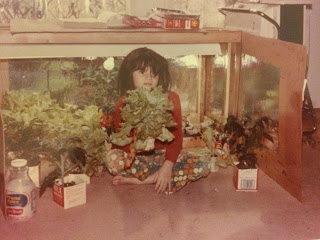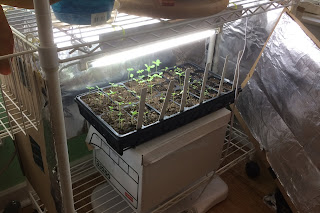Last weekend, my daughter
camped out with other members of her mountain bike team on the night before the
race. We dropped her off at the campsite before heading for our own, cozy hotel
room.
The family camping area
was packed to capacity. Kids ran around yelling; someone had a campfire going.
The trees, the smell of woodsmoke, and the noise brought me back to the times
my dad took us all camping, and my brother and I were the ones running around
playing loud games. I vaguely recall helping out with the tent—something about
poles that fit inside each other, perhaps matched by color? Sleeping bags, of
course, and maybe air mattresses that had to be blown up? And Cutter’s, of course,
to keep off the mosquitoes.
You can tell I didn’t
really take to camping, since I haven’t camped for years. Still, standing there
smelling the woodsmoke, I thought about my dad and was glad that he had taken
us.
I thought about my dad a
month or so earlier as well, when my daughter was going kayaking with members
of Boat Club. They needed another adult
on the water. So I rented a plastic kayak along with the others and got
in awkwardly. Once on the water, though, I really enjoyed it. I watched the
kids messing around and wished that my dad could be there to see his
granddaughter on the water—and to paddle his own kayak again.
 |
| M out on the water in her kayak |
I remember helping him
put together the kayak when I was a kid. It came in several heavy canvas bags.
Wooden pieces had to be slotted together, poles had to be inserted along the
sides, and then the two ends had to be pushed into the rubberized hull before
they could be locked together and the seat backs put in place.
 |
| Taking a last look at the Klepper Aerius. |
Then we would go out on
the quiet lake and paddle around the edges.
There are other things I
learned from my dad. He liked to make things, sometimes from
kits. I remember a down parka, a paper clock with a pendulum, and of course the
electric organ, which took forever with all those wires to solder. I learned
some basic skills from him as he carried out his projects—how to use the sewing
machine, and how to cut and score paper. (I didn’t get into electronics, though he let me try soldering some wires.)
He also had a great
interest in the latest technology and insisted on getting a computer back when
it seemed like a crazy idea. I mean, who had a computer in their home?
But he got a Sinclair and
it had so little memory that you could easily type in a Basic program and run
out of room before you were done. And what do you know—he was right about
computers being interesting. Now everyone has one.
He liked to garden as
well, but since he also liked to travel and we moved every two years, his
gardening was limited. I, on the other hand, was determined to live in one
place when I grew up and have a really nice garden. But we shared a love of
home-grown tomatoes. I always try to have tomato plants, even in years when the
rest of the garden is in sad shape.
 |
| Me as a kid in front of his light-box for growing plants |
 |
| My own attempt at a light-box for starting plants |
There were things my dad
didn’t like, certainly. He was scornful of “ya-ya music”, which is what he
called rock, and probably most music that followed it. (Did he get the term
from the Beatles’ song “I love you, yeah, yeah, yeah, I love you, yeah, yeah,
yeah”?) He abhorred the practice of having a TV in the living room (never in
our house) or watching TV during meals. Really, he disliked most TV shows except
documentaries.
And he could have the
most irritating little smirk when he felt he was winning an argument.
Overall though, he had a
lot of enthusiasm and a lot of interests. I wish that he could be here to share them with his granddaughter.

